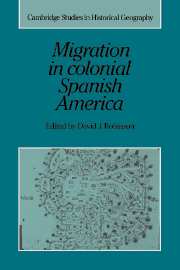Book contents
- Frontmatter
- Contents
- List of figures
- List of tables
- Notes on contributors
- Preface
- 1 Introduction: towards a typology of migration in colonial Spanish America
- 2 Indian migration and community formation: an analysis of congregación in colonial Guatemala
- 3 Migration in colonial Peru: an overview
- 4 Migration processes in Upper Peru in the seventeenth century
- 5 “ … residente en esa ciudad… ”: urban migrants in colonial Cuzco
- 6 Frontier workers and social change: Pilaya y Paspaya (Bolivia) in the early eighteenth century
- 7 Student migration to colonial urban centers: Guadalajara and Lima
- 8 Migration, mobility, and the mining towns of colonial northern Mexico
- 9 Migration patterns of the novices of the Order of San Francisco in Mexico City, 1649–1749
- 10 Migration to major metropoles in colonial Mexico
- 11 Marriage, migration, and settling down: Parral (Nueva Vizcaya), 1770–1788
- 12 Informal settlement and fugitive migration amongst the Indians of late-colonial Chiapas, Mexico
- 13 Migration and settlement in Costa Rica, 1700–1850
- 14 Seventeenth-century Indian migration in the Venezuelan Andes
- 15 Indian migrations in the Audiencia of Quito: Crown manipulation and local co-optation
- Notes
- Index
12 - Informal settlement and fugitive migration amongst the Indians of late-colonial Chiapas, Mexico
Published online by Cambridge University Press: 07 October 2009
- Frontmatter
- Contents
- List of figures
- List of tables
- Notes on contributors
- Preface
- 1 Introduction: towards a typology of migration in colonial Spanish America
- 2 Indian migration and community formation: an analysis of congregación in colonial Guatemala
- 3 Migration in colonial Peru: an overview
- 4 Migration processes in Upper Peru in the seventeenth century
- 5 “ … residente en esa ciudad… ”: urban migrants in colonial Cuzco
- 6 Frontier workers and social change: Pilaya y Paspaya (Bolivia) in the early eighteenth century
- 7 Student migration to colonial urban centers: Guadalajara and Lima
- 8 Migration, mobility, and the mining towns of colonial northern Mexico
- 9 Migration patterns of the novices of the Order of San Francisco in Mexico City, 1649–1749
- 10 Migration to major metropoles in colonial Mexico
- 11 Marriage, migration, and settling down: Parral (Nueva Vizcaya), 1770–1788
- 12 Informal settlement and fugitive migration amongst the Indians of late-colonial Chiapas, Mexico
- 13 Migration and settlement in Costa Rica, 1700–1850
- 14 Seventeenth-century Indian migration in the Venezuelan Andes
- 15 Indian migrations in the Audiencia of Quito: Crown manipulation and local co-optation
- Notes
- Index
Summary
Migration as a fundamental adjunct of settlement – the veins through which the blood of population moves – needs to be measured and assigned a place in the fabric of colonial spatial and social organization. Various types of migration and motives for such movement have come to light. Spanish colonial administrators were themselves aware of the complex mobility of native populations. Individuals moved with, or were followed by their families, or moved alone in pursuit of marriage and the opportunity to work, or by contrast, to flee looming death and unpaid tribute. Villages collapsed and their remnants dispersed to new sites, or corporate decisions might be taken to relocate in proximity to cash crop economies. Whole regions underwent upheaval and experienced economic decline or boom, with consequent dislocation and relocation. This study discusses recorded migration amongst the Indians of colonial Chiapas, with particular emphasis on reactions to eighteenth-century crises in the region.
The idea of fugitivism, or flight – the most common words used by Spanish administrators to describe absent Indians – implies deliberate concealment of self from authority. Its use to describe such movement by Indian individuals and groups might be thought inappropriate in most situations, although the word is employed widely by Latin American historians of the colony. There is nothing in the documents for Spanish-controlled Chiapas to suggest that the absent were hunted down, apart from the entradas made against the Lacandon Indians of the frontier during the seventeenth century. But undramatic movement by those who declined to stay put was seen as doing violence to the Spanish conception of ordered administration, undermining the fabric of the system, calling down on offenders an indictment of unreason, godlessness, and sheer contrary-minded elusiveness.
- Type
- Chapter
- Information
- Migration in Colonial Spanish America , pp. 238 - 278Publisher: Cambridge University PressPrint publication year: 1990
- 3
- Cited by



